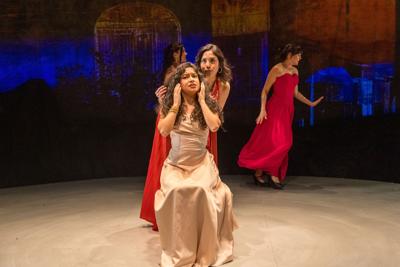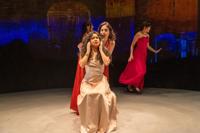
Blanca Isabella, Newt Arlandiz, Valerie Rose Vega and Noelle Franco in "Just Like Us." (Photo by Grettel Cortes Photography)
Theater is a one-of-a-kind medium, older than television and film, yet it is the underdog in this city of lights, camera and influencers.
The Latino Theatre Company, with an almost 50-year legacy, has been edging its own corner of art and influence and power when it comes to how we tell Latina-Latino stories. In their current spring season, they've recently had their opening night for the Karen Zacarias play adaptation of Helen Thorpe’s book “Just Likes Us.”
The current performances running through now and May 18th, are located at the downtown L.A. Los Angeles Theatre Center in one of their most intimate theatres.
The immigrant experience for young people coming of age, trying to pursue higher education can be incredibly isolating. The play, inspired by true events, follows the lives of four mixed status high school girls on the verge of graduating high school and planning for their college experiences. They all encounter different external to internal struggles in this journey and you as an audience member in the theatre get taken through the ride.
The lead, played by Blanca Isabella, is a complex, sharp and strong character who navigates hearing of others getting full rides to schools because of their legal status and knows she deserves better because she is the valedictorian. Yet because of her status, the schools she’s admitted to can’t offer her the financial packages others are getting. Noelle Franco, Valerie Rose Vega and Newt Arlandiz share the experience of also navigating the hurdles of being mixed status with one needing to care for a younger sibling during college and another experiencing the realities of not being able to disclose their status to classmates while in college because of the repercussions.
Over a long, engaging and enlightening zoom call, I got to chat with the director Fidel Gomez, whose Dodger World Series hoodie and hat let me know he was connected to this city. I also got to see one of the previews and have thought very carefully about what I experienced, how undocumented stories are told and, although it being a play set 20 years ago, it continues to punch the fists into my gut.
The play is set in Colorado during the early 2000s before the Dream Act in California, during the 2006 protests and walkouts and way before the first Donald Trump administration.
“Sometimes the material, in the middle of rehearsal and you're like, I started getting stressed out. You know what I mean?” Gomez tells me as he leans in. “Because, you know, these things are, these things are happening right now. You know, these things are, like literally in our city, you know, on our streets.”
He’s obviously right. Right outside of the theatre is a city where there are cooperatives working together to stop raids and deportations, where the city council has reasserted its sanctuary status.
In the play, we also get the perspective of the outsider who introduces us to the world if we didn’tknow it before. Gomez calls it a “peaceful conversation” when he says there is the other point of view, too. Karen Zacarias, the playwright, adapted a nonfiction book, one that took Helen Thorpe several years to put together through a journalistic perspective. It is Helen, a white journalist, who breaks the fourth wall, telling us directly what the stakes are, who and what they are affected by. Yet, she steps in with the characters and at times needs to intervene in their lives.
This is how real life is, however. As journalists we are in the world the “subject” is in. The play is as much about the outsider, their access, their privilege and, if anything, their power. Some of us may wonder, why is there a white woman taking us through the story? The reality is exactly what happened: Helen Thorpe gained the trust of these young girls and their families to document their experiences, protect their privacy and ultimately write a best-selling book about the rite of passage of undocumented young girls in the 2000s in Colorado. Gomez also tells me that he had the honor to speak to the girls portrayed in the book and the play and are grateful and happy these projects were made.
The audience for the play then becomes an accomplice. While this is indeed a project and work of “by us, for us” it is also a tool for those who care or should care and a tool for reflection for those of us who identify as immigrants or undocumented.
Gomez tells me he also doesn’t do this because he thinks a play will fix the immigration system, but he knows it will provide the grounding, push or inspiration someone may need.
The stage design, lighting and sound still continues to amaze me as I write this. Gomez tells me, everyone involved in the design are also not native-born artists. For example, the scene designer François-Pierre Couture is French Canadian but has designed a stage that mirrors that internal insider-outsider discussion one has as an audience member. The stage becomes an essential piece to the story you experience, it tells you to know and expect the performances to be amplified. Gomez tells me that he had to adapt to the stage once it was finalized because of the immense opportunities the blocking was offered.
I was amazed at how much I kept understanding outside of the script because of all we were offered from everyone.
But this play is in Colorado, in the past. How does it speak to this moment? So many immigrants who came of age in the 2000s are now parents, administrators, and still a part of the fight. And part of this fight is also about reminding people that, “hey, we’ve been here before.” There is still so much to be remembered and the play tries to offer that. Now for some immigrants, this play is a clear reflection to them of the complexities that they may have never seen on the stage. It will be cathartic but it will be a one-of-a-kind experience.
The Latino Theatre Company offers free and discounted tickets to community college and LAUSD students. For many of them, they are already getting bussed to see this play or have been invited directly, Gomez tells me.
The following are the next dates for "Just Like Us":
Saturday, April 26 - 8:00PM
Sunday, April 27 - 4:00PM
Thursday, May 1 - 8:00PM
Friday, May 2 - 8:00PM
Saturday, May 3 - 8:00PM
Sunday, May 4 - 4:00PM
Thursday, May 8 - 8:00PM
Friday, May 9 - 8:00PM
Saturday, May 10 - 8:00PM
Sunday, May 11 - 4:00PM
Thursday, May 15 - 8:00PM
Friday, May 16 - 8:00PM
Saturday, May 17 - 8:00PM
Sunday, May 18 - 4:00PM











(0) comments
Welcome to the discussion.
Log In
Keep it Clean. Please avoid obscene, vulgar, lewd, racist or sexually-oriented language.
PLEASE TURN OFF YOUR CAPS LOCK.
Don't Threaten. Threats of harming another person will not be tolerated.
Be Truthful. Don't knowingly lie about anyone or anything.
Be Nice. No racism, sexism or any sort of -ism that is degrading to another person.
Be Proactive. Use the 'Report' link on each comment to let us know of abusive posts.
Share with Us. We'd love to hear eyewitness accounts, the history behind an article.